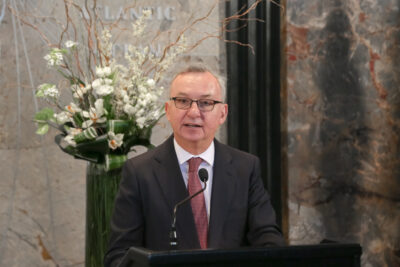This article was reported and written in collaboration with The New York Times.
Dr. José Baselga, who resigned his position as the top doctor at Memorial Sloan Kettering Cancer Center after failing to disclose millions of dollars in payments from drug companies, is now going to work for one of them.
AstraZeneca, the British-Swedish drug maker, announced on Monday that it had hired Dr. Baselga as its head of research and development in oncology, a newly created unit that reflects the company’s shift toward cancer treatments, one of the hottest areas in the drug industry.
In a statement, AstraZeneca’s chief executive, Pascal Soriot, described Baselga as “an outstanding scientific leader.” “José’s research and clinical achievements have led to the development of several innovative medicines, and he is an international thought leader in cancer care and clinical research,” he said.
Baselga stepped down in September from his role as chief medical officer at the cancer center after The New York Times and ProPublica reported that he had failed to accurately disclose his conflicts of interest in dozens of articles in medical journals. He later resigned from the boards of the drug maker Bristol-Myers Squibb and the radiation equipment manufacturer Varian Medical Systems.
Although Memorial Sloan Kettering has said that Baselga was not fired, hospital leaders have indicated that he was forced out. In October, Douglas A. Warner III, then the chairman of the cancer center’s board, told the staff that Baselga’s actions “left us no choice.”
In December, the American Association for Cancer Research said that Baselga, at its request, had resigned his post as one of two editors in chief of its medical journal Cancer Discovery because he did “not adhere to the high standards” of conflict-of-interest disclosures that the group expects of its leaders. Some of his omissions involved articles that were published in Cancer Discovery while he was an editor in chief.
A spokesman for AstraZeneca said Baselga was not available for comment, but the doctor told Reuters on Monday that he took responsibility for his disclosure lapses. He also said the cancer association had concluded his failures were “inadvertent,” and said many of his company relationships were publicly available on a federal database of physician payments by drug and device manufacturers. However, some of the relationships that Baselga failed to disclose were with small biotech startups that are not required to report to the federal government.
“Dr. Baselga is one of the best scientists in the field of oncology,” said the spokesman, Gonzalo Viña. “We evaluated the series of inadvertent omissions, which have since been addressed and it is not for us to comment about the previous roles he held.”
AstraZeneca paid Baselga $28,750 for consulting work in 2013 and 2014 related to unspecified drugs, according to the federal database. He failed to disclose any relationships with companies, including AstraZeneca, in dozens of articles in recent years.
Baselga, 59, is an expert in breast cancer research and played a key role in the development of Herceptin by Genentech, a subsidiary of Roche. He came to Memorial Sloan Kettering in 2013 after serving as chief of hematology and oncology at Massachusetts General Hospital in Boston. Before that, he was a leader at the Vall d’Hebron Institute of Oncology in Barcelona, Spain.
Since September, Baselga has corrected his conflict-of-interest disclosures in several journals, including in The New England Journal of Medicine and in Cancer Discovery. In a note that accompanied Baselga’s correction in The New England Journal of Medicine, editors described his failure as a “breach of trust.”
AstraZeneca’s decision to hire Baselga is part of an effort by the drug maker to focus more directly on cancer research, which has generated extensive interest from investors and companies in recent years amid a series of breakthroughs. The company sells several cancer drugs, including the lung cancer drug Tagrisso and Lynparza, which treats a number of cancers. It has suffered some recent setbacks, such as a failed trial of its lung cancer drug Imfinzi.
Under the company’s new structure, Baselga will oversee the development of cancer drugs from early research to late-stage clinical trials, and a separate research unit will focus on other disease areas. Each unit will have its own commercial team to promote the products.
“This new structure will support growth and sharpen the focus on our main therapy areas, speeding up decisions and making us more productive in our mission to bring innovative medicines to patients,” Soriot said in the statement.
In the same statement, Baselga described his new role as a “dream job” and said the reorganization will “accelerate our work to bring transformative medicines to patients.”
Filed under:




